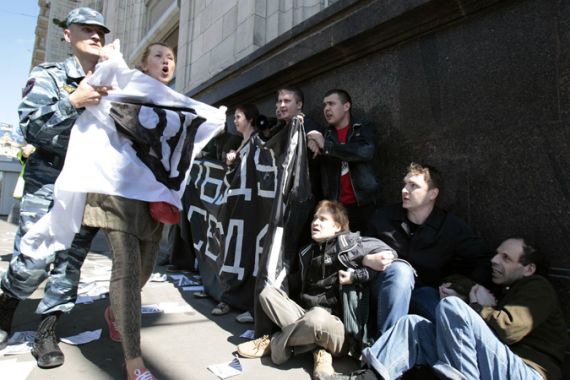Russian legislators pass protest-fines bill
Opposition decries bill which will raise maximum fine to $9,000 for citizens taking part in unsanctioned rallies.

The Russian lower house of parliament has adopted a controversial bill that raises fines 150-fold for people taking part in unsanctioned protests, a move aimed at discouraging the opposition from challenging the Kremlin.
The bill would increase maximum fines from the current 2,000 rubles ($60) to 300,000 rubles ($9,000), and comes after a series of massive protests that have reflected growing public frustration with President Vladimir Putin’s effective 12-year rule.
The bill raises the fine for organisers of illegal protests to one million rubles ($32,100)
In an unusually tense debate in the Duma, long a rubber-stamp body for the Kremlin, opposition legislators argued into the night on Tuesday proposing around 400 amendments to mark their disapproval.
But members of the Kremlin’s majority United Russia party voted the amendments down one by one and used its parliamentary majority to approve the bill. The final vote was 241-147.
Following fierce criticism by opposition legislators, some of the most controversial proposals, such as fines for internet users who spread the word about rallies, were dropped.
‘Constitutional violation’
Russian authorities routinely deny permission for opposition rallies or offer rally organisers venues away from the city centre.
|
“This odious bill is an attempt to scare the people and shut their mouth “ – Sergei Mironov, Fair Russia leader |
Police often use force to break up unsanctioned protests.
Opposition leaders and rights activists, including the US-based group Human Rights Watch, say the law violates the 31st article of Russia’s constitution on the right to free assembly.
The Kremlin wants the new bill to become law by next Tuesday when the opposition plans a major protest in Moscow.
The bill will require approval by the upper house and Putin’s signature, but both steps are formalities.
Since returning to the presidency in May, Putin has toughened his line towards the opposition, whose protests over the winter drew up to 100,000 people in an unprecedented challenge to his rule.
Due to term limits, Putin spent four years in the prime minister’s seat after already serving two consecutive terms as president from 2000 to 2008.
‘Spit in the face’
Sergei Mironov, the leader of the A Just Russia party, said the bill was a “spit in the face of the Russian people”.
“This odious bill is an attempt to scare the people and shut their mouth,” he said, before leading his members out of the session hall before the final vote.
He and other opposition leaders warned that the law would exacerbate tensions in society and leave the public with no free outlet for discontent.
“It will destroy the social peace and deepen the divide in the society,” said Anatoly Lokot of the Communist Party.
“Instead of a dialogue you are offering a big stick.”
Prime Minister Dmitry Medvedev, who heads the United Russia party, tentatively approved the bill in a televised interview on Monday, saying higher fines were needed as a deterrent.
“Do we need huge fines? Huge ones, no, higher ones, yes,” he said. “Because if you break a rule one day, then the next day you pay 500 rubles and do the same thing, this is unacceptable.”
The bill also includes similar punishments for any mass public gathering, even if it lacks the formal signs of a political protest.
The wording “being en masse simultaneously” was seen as a response to a series of recent demonstrations in Moscow, where participants left their slogans and posters at home and walked silently so that their actions did not formally count as rallies.
Several dozen opposition activists, including the leader of the liberal Yabloko party, were detained on Tuesday morning outside the State Duma for holding an unsanctioned protest against the bill. Some were released shortly afterwards.